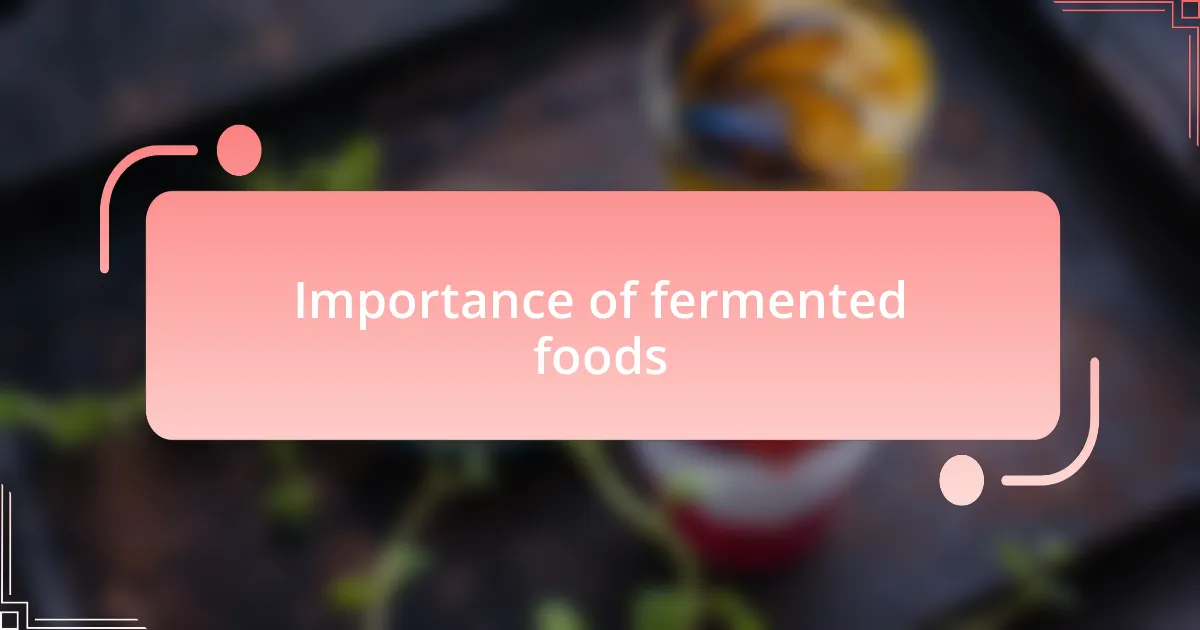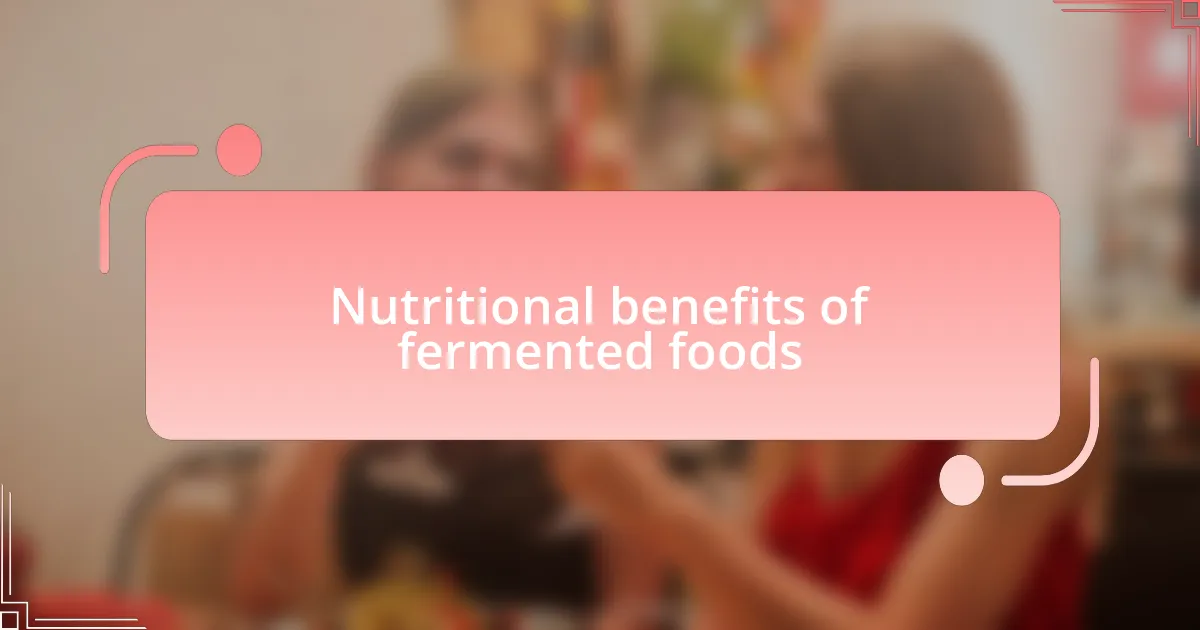Key takeaways:
- Healthy eating focuses on nourishing the body with balanced nutrients rather than just calorie counting.
- Incorporating fermented foods supports gut health and boosts the immune system, positively impacting physical and mental well-being.
- The process of fermentation not only enhances nutrient absorption but also allows for a variety of delicious food options that deepen our appreciation for what we eat.
- Starting small and exploring new fermented foods can easily enhance your diet and introduce new flavors.

Healthy eating defined
Healthy eating is not just about counting calories; it’s about nourishing your body with the right foods. I remember when I first shifted my focus from restrictive diets to a more holistic view of what I eat. It was a game changer—realizing that food is fuel and can greatly influence my mood and energy levels made such a difference in my lifestyle.
In my journey, I’ve come to see healthy eating as a balance of nutrients that work in harmony. It’s not solely about what’s on your plate, but how those choices align with your lifestyle and health goals. For instance, when I began to incorporate more whole foods, like fruits and vegetables, the impact on my overall well-being was immediate. Have you ever noticed how a colorful plate can brighten your day?
Ultimately, healthy eating is about transparency with your own choices. Sometimes, I ask myself—am I eating to satisfy a craving or to nurture my body? I think this reflection is crucial. It prompts me to make decisions that prioritize my health, helping me create a lasting relationship with food that’s based on respect and understanding rather than guilt or restriction.

Importance of fermented foods
Fermented foods play an essential role in promoting gut health, which is foundational to our overall well-being. I vividly remember the first time I tried kimchi; the robust flavors not only excited my palate but also introduced a world of probiotics into my diet. Probiotics are beneficial bacteria that support digestion and can significantly enhance nutrient absorption. Have you ever felt a noticeable difference in your gut after consuming a bowl of yogurt or a serving of sauerkraut?
Beyond gut health, fermented foods contribute to a stronger immune system. After adopting a diet rich in these foods, I found myself getting sick less often, which sparked my curiosity about their protective properties. They contain compounds that may help shield the body against infections and inflammation—who doesn’t want that? It’s fascinating how something so simple can bolster our defenses and keep us feeling vibrant.
The importance of incorporating fermented foods goes beyond physical health; they can also elevate our mental well-being. Research suggests that gut health is linked to mood regulation, and I can attest to this! When I added more miso soup and kefir to my meals, I noticed a shift in my mood. Do you ever feel uplifted after enjoying a delicious, tangy dish? It’s remarkable how these foods can influence not just our bodies, but our minds too.

Types of fermented foods
Fermented foods come in a delightful variety that can cater to different tastes and dietary preferences. For instance, you might enjoy the tangy flavor of kimchi, a staple in Korean cuisine, or the creamy texture of yogurt, which has been a breakfast favorite for many. I still remember the first time I mixed my homemade yogurt with fresh fruit; it was like a dance of flavors in my mouth. Have you found your favorite fermented food yet?
Then there are drinks like kombucha, a fizzy tea that can be both refreshing and packed with probiotics. I recall my surprise at how a simple fermented beverage could feel like a little celebration in a glass. It’s interesting how different types of fermented foods not only vary in flavor but also in their probiotic profiles. Do you think about how these variations might affect your gut health differently?
Another exciting category is the world of ferments that you can easily prepare at home, such as sauerkraut or pickles. The first time I attempted making sauerkraut, I felt a mix of curiosity and apprehension. Watching those cabbage leaves transform over time was almost magical! It reminded me that engaging in the process of fermentation can deepen our appreciation for the food we consume. Have you tried your hand at fermenting yet?

Nutritional benefits of fermented foods
The nutritional benefits of fermented foods are truly remarkable and can have a positive impact on our well-being. For example, the probiotics found in these foods can help balance the gut microbiome. When I started incorporating more fermented foods into my diet, I noticed an improvement in my digestion that was both noticeable and encouraging. Have you experienced any changes in how you feel after eating fermented foods?
Additionally, many fermented foods are rich in vitamins and minerals, often more so than their unfermented counterparts. I remember the first time I tried miso soup; I was amazed to learn that miso is not only delicious but also packed with nutrients and antioxidants. Finding ways to boost my intake of essential vitamins through simple changes in my diet has been incredibly rewarding. Have you considered how these nutrient-dense options might enhance your meals?
Moreover, the process of fermentation can enhance the bioavailability of certain nutrients, making it easier for our bodies to absorb them. This was a revelation for me while experimenting with different ferments. I felt a sense of accomplishment realizing that I could maximize the nutritional potential of everyday ingredients. Isn’t it fascinating how a bit of culture—literally—can transform our relationship with food?

My introduction to fermented foods
Discovering fermented foods was a game changer for me. My journey began at a local farmers’ market, where I stumbled upon a stall brimming with jars of colorful kimchi and kombucha. The vibrant displays caught my eye, but it was the vendor’s enthusiasm that really piqued my interest. I couldn’t help but ask, “What’s so special about these foods?” Little did I know, that question would lead to a profound shift in my understanding of nutrition.
As I delved deeper into the world of fermentation, I began experimenting in my own kitchen. I can still remember that first batch of homemade sauerkraut; the crispness of the cabbage, the tangy smell of fermentation—it was exhilarating! Watching the transformation unfold, I felt a deep sense of connection to the food I was creating. Have you ever made a dish from scratch and felt that sense of pride? This was that feeling, multiplied by the knowledge that I was nurturing my gut health with each bite.
Through this exploration, I became fascinated by the rich traditions behind these foods. Learning that cultures around the world have relied on fermentation for centuries made me appreciate these flavors even more. I found myself asking, “What stories do these foods carry?” Each jar seemed to hold generations of knowledge about preservation and health. It made my culinary journey not just about eating, but about connecting with history and community. Have you ever thought about what your food choices say about you?

Tips for incorporating fermented foods
When it comes to incorporating fermented foods into your diet, start small. I found that adding a dollop of yogurt to my morning smoothie was an easy introduction. It wasn’t overwhelming, and it elevated the tangy flavor, enhancing my breakfast while boosting my gut health—all with minimal effort.
Something that worked wonders for me was using fermented foods as a flavorful companion to meals. For instance, I started adding sauerkraut to sandwiches, where the crunch and acidity layered beautifully with the savory ingredients. Have you ever tried that surprising combination of flavors? It might just be the twist your meals need to become a little more exciting.
Lastly, don’t hesitate to explore new varieties of fermented foods that you might not have tried yet. I remember when I first tasted miso. It opened a whole new avenue of flavor for my soups and dressings. Why not challenge yourself to pick a new fermented food each week? You might find a new favorite while effortlessly enhancing your overall health.